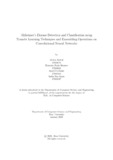Alzheimer’s Disease detection and classification using transfer learning techniques and ensembling operations on convolutional neural networks
Abstract
Alzheimer’s disease (AD) is a neurological disease that affects the healthy cells of
the brain and results in people having long-term memory loss, thinking problems,
disorientation, behavioral inconsistencies and finally death. When the disease gets
detected, the pathological load is already high and there is no way of coming back
from there. This neurodegenerative disease consists of three general stages which we
classified in our research that includes very mild (early stage), mild (middle stage)
and finally, the moderate stage (late stage). We implemented 5 existing efficient and
recent CNN models such as VGG19, Inception-ResNet-v2, ResNet152v2, EfficientNetB5 and EfficientNetB6 including one model of our own. Later, we did ensembling
operations thrice with multiple combinations of the models to enhance our outcome
and that was achieved since this gave improved accuracy of up to around 96% compared to the individual models where the maximum was 92.2% from EfficientNetB5.
The results achieved showed precise detection and classification of AD and its stages
even though data was limited and it was a challenge differentiating a healthy brain
from that of a subject with AD.

